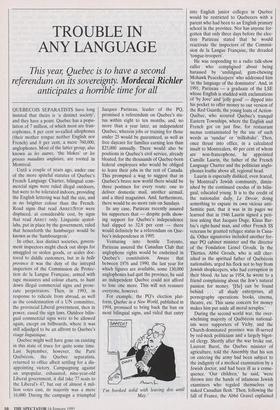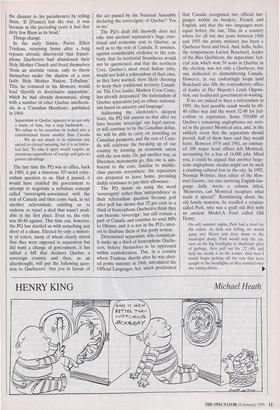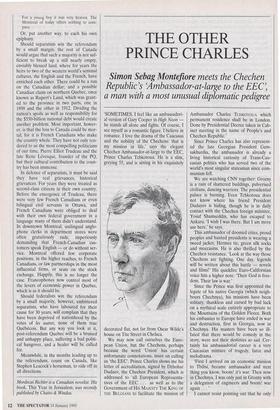TROUBLE IN ANY LANGUAGE
This year Quebec is to have a second
referendum on its sovereignty. Mordecai Richler
anticipates a horrible time for all
QUEBECOIS SEPARATISTS have long insisted that theirs is 'a distinct society', and they have a point. Quebec has a popu- lation of 7 million, of which most are fran- cophones, 8 per cent so-called allophones (their mother tongue neither English nor French) and 8 per cent, a mere 760,000, anglophones. Most of the latter group, also known as les autres, 'the blokes' or les grosses maudites anglaises, are rooted in Montreal.
Until a couple of years ago, under one of the more spiteful statutes of Quebec's French Language Charter, bilingual com- mercial signs were ruled illegal outdoors, but were to be tolerated indoors, providing the English lettering was half the size, and in no brighter colour than the French. Road signs that read ARRET/STOP were displaced, at considerable cost, by signs that read ARRET only. Linguistic ayatol- lahs, put in place by the government, ruled that henceforth the hamburger would be known as the tambourgeois'.
In other, less distinct societies, govern- ment inspectors might check out shops for smuggled or stolen goods, or scales doc- tored to diddle customers, but in la belle province it was the duty of the intrepid inspectors of the Commission de Protec- tion de la Langue Francaise, armed with tape measures and colour charts, to hunt down illegal commercial signs and prose- cute perpetrators. Then, in 1993, in response to ridicule from abroad, as well as the condemnation of a UN committee, the provincial Liberal government, then in power, eased the sign laws. Outdoor bilin- gual commercial signs were to be allowed again, except on billboards, where it was still adjudged to be an affront to Quebec's visage linguistique.
Quebec might well have gone on existing in this state of truce for quite some time. Last September, however, the Parti Quebecois, the Quebec separatists, returned to office albeit settling for a dis- appointing victory. Campaigning against an unpopular, exhausted, nine-year-old Liberal government, it did take 77 seats to the Liberal's 47, but out of almost 4 mil- lion votes cast, its majority was a mere 16,000. During the campaign a triumphal Jacques Parizeau, leader of the PQ, promised a referendum on Quebec's sta- tus within eight to ten months, and, no more than a year later, an independent Quebec, wherein jobs or training for those under 25 would be guaranteed, as well as free daycare for families earning less than $25,000 annually. There would also be positions in Quebec's civil service, already bloated, for the thousands of Quebec-born federal employees who would be obliged to leave their jobs in the rest of Canada. This prompted a wag to suggest that in Quebec's brave new world there wbuld be three postmen for every route: one to deliver domestic mail, another airmail, and a third magazines. And, furthermore, there would be no more rain on Sundays.
In any case, Parizeau recently assured his supporters that — despite polls show- ing support for Quebec's independence had slipped to .32.8 per cent — there would definitely be a referendum on Que- bec's independence in 1995.
Venturing into hostile Toronto, Parizeau assured the Canadian Club that anglophone rights would be enshrined in Quebec's constitution. Aware that between 1976 and 1990, the last year for which figures are available, some 130,000 anglophones had quit the province, he said an independent Quebec could not afford to lose one more. This will not reassure everyone, however.
For example, the PQ's election plat- form, Quebec in a New World, published in 1994, promised to bring back the ban on most bilingual signs, and ruled that entry 'I'm booked solid with leaving dos until May.' into English junior colleges in Quebec would be restricted to Quebecers with a parent who had been to an English primary school in the province. Nor has anyone for- gotten that only three days before the elec- tion Parizeau stated that he would reactivate the inspectors of the Commis- sion de la Langue Frangaise, the dreaded `tongue-troopers'.
He was responding to a radio talk-show caller who compliined about being harassed by `unilingual, gum-chewing Mohawk Peacekeepers' who addressed him 'in the language of the dominator'. And, in 1991, Parizeau — a graduate of the LSE whose English is studded with exclamations of `by Jove' and 'jolly good' — dipped into his pocket to offer money to our version of the Red Guards, the young louts of Action- Quebec, who scoured Quebec's tranquil Eastern Townships, where the English and French got on just fine, for restaurant menus contaminated by the use of such words as 'sundae' or 'milkshake'. Then, once thrust into office, in a calculated insult to Montrealers, 40 per cent of whom are non-francophone, he appointed Camille Laurin, the father of the French Language Charter and the politician anglo- phones loathe above all, regional head.
Laurin is especially disliked, even feared, by Montreal's Jewish community, dimin- ished by the continued exodus of its bilin- gual, educated young. It is to the credit of the nationalist daily, Le Devoir, doing something to expiate its own vicious anti- Semitic past, that it was in its pages we learned that in 1946 Laurin signed a peti- tion asking that Jacques Duge, Klaus Bar- bie's right-hand man, and other French SS veterans be granted refugee status in Cana- da. Other signatories included another for- mer PQ cabinet minister and the director of the Fondation Lionel Groulx. In the Thirties, Abbe Groulx, who is still cher- ished as the spiritual father of Quebecois nationalists, urged his flock not to buy from Jewish shopkeepers, who had corruption in their blood. As late as 1954, he wrote to a friend complaining about the Jew's natural passion for money. IHel can be found behind . . . all shady enterprises, all pornography operations: books, cinema, theatre, etc. This same concern for money makes him put aside all moral scruples.'
During the second world war, the over- whelming majority of Quebecois national- ists were supporters of Vichy, and the Church-dominated province was ill-served by red-neck politicians and a largely bigot- ed clergy. Shortly after the war broke out, Laurent Barre, the Quebec minister of agriculture, told the Assembly that his son on entering the army had been subject to the indignity of a medical examination by a Jewish doctor, and had been ill as a conse- quence. 'Our children,' he said, 'were thrown into the hands of infamous Jewish examiners who regaled themselves on naked Canadian flesh.' Then, following the fall of France, the Abbe Gravel explained the disaster to his parishioners by telling them, 'If [France] lost the war, it was because in the preceding years it had that dirty Jew Blum as its head.'
Things change.
In the early Sixties, Pierre Elliot Trudeau, returning home after a long sojourn abroad, discovered that franco- phone Quebecers had abandoned their Holy Mother Church and freed themselves `from an atavistic vision, only to throw themselves under the shadow of a new faith: Holy Mother Nation. Tribalism.' This, he ventured in his Memoirs, would lead 'directly to doctrinaire separatism', which he had already denounced, along with a number of other Quebec intellectu- als, in a 'Canadian Manifesto', published in 1964:
Separatism in Quebec appears to us not only a waste of time, but a step backwards ... We refuse to let ourselves be locked into a constitutional frame smaller than Canada ... We do not attach to its existence any sacred or eternal meaning, but it is an histor- ical fact. To take it apart would require an enormous expenditure of energy and gain no proven advantage ...
The last time the PQ was in office, back in 1980, it put a timorous 107-word refer- endum question to us. Had it passed, it would have enabled the government to attempt to negotiate a nebulous concept called 'sovereignty-association' with the rest of Canada and then come back, in yet another referendum, entitling us to endorse or reject a deal that wasn't avail- able in the first place. Even so, the vote was 60-40 against. This time out, however, the PQ has startled us with something just short of a ukase. Elected by only a minori- ty of voters, many of whom clearly stated that they were opposed to separation but did want a change of government, it has tabled a bill that declares Quebec a sovereign country and then, as an afterthought, will put the following ques- tion to Quebecers: 'Are you in favour of the act passed by the National Assembly declaring the sovereignty of Quebec? Yes or no.'
The PQ's draft bill shrewdly does not take into account separation's huge emo- tional and economic cost to Quebec, as well as to the rest of Canada. It assumes, against considerable evidence to the con- trary, that its territorial boundaries would not be questioned; and that the northern Cree, Quebec's most vocal Indian tribe, would not hold a referendum of their own, as they have warned, most likely choosing to keep their traditional territory Canadi- an. The Cree leader, Mathew Coon Come, has already denounced 'the nationalism of Quebec separatists [as] an ethnic national- ism based on ancestry and language'.
Addressing the electorate's deepest fears, the PQ bill assures us that after we have become 'sovereign' our legal curren- cy will continue to be the Canadian dollar, we will be able to carry on travelling on Canadian passports, and the rest of Cana- da will celebrate the breaking up of our country by forming an economic union with the new state. Or, put another way, as liberation movements go, this one is ado- lescent to the core, familiar to middle- class parents everywhere: the separatists are prepared to leave home, providing daddy continues to pay their allowance. The PQ insists on using the word `sovereignty' rather than 'independence' in their referendum question because poll after poll has shown that 25 per cent to a third of francophone Quebecers think they can become 'sovereign', but still remain a part of Canada and continue to send MPs to Ottawa, and it is not in the PQ's inter- est to disabuse them of this goofy notion.
Determined separatists, who consistent- ly make up a third of francophone Quebe- cers, believe themselves to be oppressed within confederation. This, in a country where Trudeau, shortly after he was elect- ed prime minister in 1968, introduced the Official Languages Act, which proclaimed that Canada recognised two official lan- guages within its borders, French and English, and that the two languages were equal before the law. This, in a country where for all but two years between 1968 and 1993 the prime minister has been a Quebecer born and bred. And, hello, hello, the tempestuous Lucien Bouchard, leader of the Bloc Quebecois, the separatists' fed- eral arm which won 54 seats in Quebec in the election, was not only a Quebecer, but one dedicated to dismembering Canada. However, in our endearingly loopy land Bouchard also fills the contradictory office of leader of Her Majesty's Loyal Opposi- tion, our traditional government-in-waiting.
If we are indeed to have a referendum in 1995, the best possible result would be 60- 40 either way and the worst 52-48 for fed- eralism or separation. Some 550,000 of Quebec's remaining anglophones are root- ed in the greater Montreal area, and, in the unlikely event that the separatists should prevail, half of them have said they would leave. Between 1976 and 1981, an estimat- ed 100 major head offices left Montreal, accounting for a loss of 14,000 jobs. Mind you, it could be argued that another large- scale anglophone exodus might not be such a crushing cultural loss to the city. In 1992, Norman Webster, then editor of the Mon- treal Gazette, our one surviving English-lan- guage daily, wrote a column titled, `Memories, can Montreal recapture what made it special?' Reminiscing about the old family mansion, he recalled a retainer called Park, who was a gruff old Brit with an ancient Model-A Ford called Old Henry.
On soft summer nights, Park had a treat for the visitor. As dusk was falling, we would jump into Henry and drive down to the municipal dump. Park would stop the car, turn on the big headlights to illuminate piles of garbage, then pull out his .22 rifle and help me steady it on the fender. And then I would begin picking off the rats that were caught in the headlights as they scuttled over the rotting debris. For a young boy it was very heaven. The Montreal of today offers nothing to com- pare.
Or, put another way, to each his own epiphany.
Should separatists win the referendum by a small margin, the rest of Canada would argue that such a majority is not suf- ficient to break up a still nearly empty, enviably blessed land, where for years the heirs to two of the western world's seminal cultures, the English and the French, have enriched each other. There could be a run on the Canadian dollar; and a possible Canadian claim on northern Quebec, once known as Rupert's Land, which was grant- ed to the province in two parts, one in 1898 and the other in 1912. Dividing the nation's spoils as well as responsibility for the $550-billion national debt would create another problem. Most important, howev- er, is that the loss to Canada could be mor- tal, for it is French Canadians who make the country whole. They have not only ren- dered to us the most compelling politicians of our time, Pierre Elliot Trudeau and the late Rene Levesque, founder of the PQ, but their cultural contribution to the coun- try has been immense.
In defence of separatists, it must be said they have real grievances, historical grievances. For years they were treated as second-class citizens in their own country. Before the emergence of Trudeau, there were very few French Canadians or even bilingual civil servants in Ottawa, and French Canadians were obliged to deal with their own federal government in a language many of them didn't understand. In downtown Montreal, unilingual anglo- phone clerks in department stores were often gratuitously rude, imperiously demanding that French-Canadian cus- tomers speak English — or do without ser- vice. Montreal offered few corporate positions, in the higher reaches, to French Canadians, or law partnerships in the most influential firms, or seats on the stock exchange. Happily, this is no longer the case. Francophones now control most of the levers of economic power in Quebec, which is as it should be.
Should federalists win the referendum by a small majority, however, embittered separatists, who have laboured for their cause for 30 years, will complain that they have been deprived of nationhood by the votes of les autres, none of them true Quebecois. But any way you look at it, post-referendum Quebec will be a bruised and unhappy place, suffering a bad politi- cal hangover, and a healer will be called for.
Meanwhile, in the months leading up to the referendum, count on Canada, like Stephen Leacock's horseman, to ride off in all directions.
Mordecai Richler is a Canadian novelist. His book, This Year in Jerusalem, was recently published by Chatto & Windus.











































 Previous page
Previous page